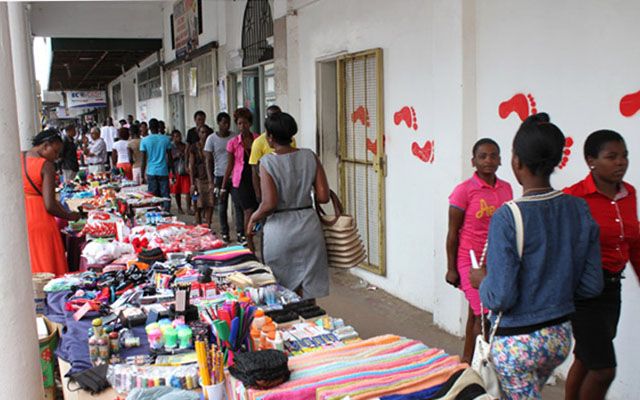Market research the missing link for informal sector


Vendors are often ply their trade in front of major retail shops
Patson Gasura Correspondent
It is not all politics in Zimbabwe. Really. In spite of the well documented challenges life goes on and Zimbabweans, like all other people, need products and services. Scenes of closed factories and low incidence of big construction projects are commonly cited as evidence of a stagnant nation.
However, on the demand side, scenes of numerous new modern houses are common spectacle. Roads are also always full of cars of all sorts day and night. The common talk in the country is that everything has become informal and for most ordinary people, it is a case of earning a leaving by the roadside. How sustainable are these micro businesses? Collectively they are key to national GDP growth?
There is need for insights on the self-employment phenomenon
Indeed, as one drives on any highway in Zimbabwe they will most certainly see people selling products and services by the road side. In the residential areas almost every house has some income generating project of one form or another.
Vendors are often stationed in front of major retail shops in most towns and cities. They claim brisk business and some of their products even have cheaper prices than in most retail shops. Their value proposition seems to be convenience and flexibility more than anything else.
Zimbabwe is a typical VUCA (volatile, uncertain, complex and ambiguous) environment for businesses and citizens alike. Such VUCA environments are recipe for market research. The Zimbabwean formal business structure has radically changed from large to small and now even micro.
From the work we do in Zimbabwe, I am convinced that there is increasing need for an evolving marketing research industry with practitioners who do not just provide insights through presentations, but also offer advisory and training services on how the new smaller businesses can convert consumer insights into customer recruitment and revenue growth. Collaborations among the small business and research suppliers could also render research more affordable and increase uptake.
There is need for insights on youth dynamics, priorities and values
One prevalent scenario (reality) in Zimbabwe is one where more and more youths are graduating to literary start businesses (from classroom to boardroom) because formal employment opportunities are on the decline. This may not be sustainable if these youths are not formally equipped with business start-up and management skills. Once started businesses must survive beyond the founders.
It is time to offer the youths opportunities rather than employment. Such a focus would indeed transform the country radically in the long run. However, how much is known about these youths in terms of their demographics and psychographics? The youths constitute more than 60 percent of the Zimbabwean population. Youths are thus a big stakeholder to shape the future of Zimbabwe. However, these same youths have been exposed to the mechanics of the modern world, values and choices through the prevailing digital era (others call it the 4th industrial revolution).
How much is known about what is in the Zimbabwean youths’ mind? It is a matter of the research industry being proactive and taking a lead.
And if we all work we can positively influence national programmes and policies on a sustained basis. The country cannot afford another loss of the youths into the Diaspora, but rather into business at various levels. It seems time has arrived to promote family anchored rural businesses (especially agro-based) to encourage urban-rural migration, at least mentally, among these youths. Vending in urban areas has been partly caused by rural-urban migration when people come to town in search of employment only to find formal employment is a thing of the past. Once again research is necessary to advice policy makers on relevant urban-rural support programmes.
There is need for insights on
surviving big businesses in
Zimbabwe
On the supply (especially big business) side although there is evidence everywhere of struggling businesses, there are few especially in ICT, retail, beverages, media and financial services that seem to be making significant progress. Success secrets of these businesses need to be known formally. With the business environment drifting towards the informal sector, there is need for market research to be commissioned by these big businesses to get the following strategic information.
1. Target market size;
2. Target market structure (competition);
3. Target market dynamics/trends
4. Consumer segmentation and profiling.
Since the main attractions for the informal sector players is convenience and flexibility, it appears the most important regular research that big businesses need to invest in is customer experience monitoring (CEM) as service delivery seems below historical levels.
Customer experience ratings should ideally be discussed together with financials and other business performance measures during board or senior management meetings.
The research industry may also be blamed for not pro-actively creating sufficient awareness for this missing link (CEM). People (called customers, patients, consumers, clients, shoppers, voters, passengers etc) continue going back where they get pleasant experiences (hap- piness).
In spite of the citizens being generally regarded as warm and friendly, good customer experience does not seem common in Zimbabwe. I think that part of the crucial role market/ing research must play is to push customer feedback measures (ratings) into the boardrooms. Boards seem overly obsessed with financial measures only. Future boards must be customer-centric first and foremost. Finances come from people.
Patson Gasura is a business consultant. He can be contacted on [email protected]










Comments